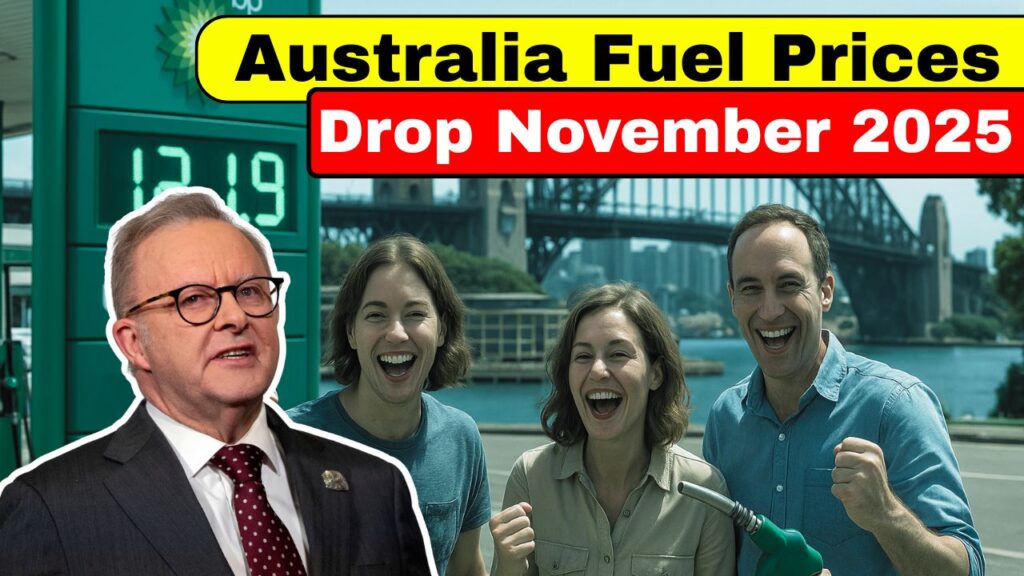Fuel Prices Crash Across Australia – Australian motorists are in for welcome news as fuel prices across the country are expected to plummet starting 15 November 2025. This long-awaited drop comes as global oil prices ease and local fuel distributors pass on the savings to drivers. The price cuts will provide a major relief for families, commuters, and transport businesses struggling with high costs. Analysts predict that petrol and diesel prices will fall significantly across major cities, giving Australian drivers a much-needed financial break ahead of the holiday season.

Fuel Price Drop Brings Relief for Australian Drivers
The recent decline in fuel prices is a positive development for millions of Australian drivers. The reduction follows a series of government efforts to stabilize living costs and strengthen energy security. Many petrol stations nationwide are expected to reflect the lower rates by 15 November 2025. The Australian government’s decision to monitor global crude markets closely has helped ensure that domestic prices remain fair and transparent. This move will directly benefit households, truck operators, and regional businesses that depend heavily on transportation for daily operations.
Australian Citizens to Save Big at the Pump
As petrol and diesel prices drop, Australian citizens are projected to save hundreds of dollars annually. Fuel economists highlight that this price correction will also ease inflation pressures across the economy. Lower transportation costs will reduce the overall cost of goods and services, boosting purchasing power for consumers. Many drivers are already planning longer trips and holiday travels in response to this cost reduction. This nationwide relief marks one of the most significant fuel adjustments since 2020, signaling stability and positive economic momentum for everyday Australians.
 Centrelink $780 Bonus Payment 2025 – Full Breakdown of Eligibility and Exact November Payment Dates
Centrelink $780 Bonus Payment 2025 – Full Breakdown of Eligibility and Exact November Payment Dates
| Fuel Type | Previous Price (per litre) | New Price (per litre) | Expected Savings |
|---|---|---|---|
| Unleaded Petrol | $2.12 | $1.85 | $0.27 |
| Premium Petrol | $2.34 | $2.05 | $0.29 |
| Diesel | $2.18 | $1.89 | $0.29 |
| LPG | $1.20 | $1.05 | $0.15 |
| Average Household Saving (Monthly) | $45–$70 | ||
Australia’s Fuel Market Responds to Global Trends
Australia’s fuel market has always been influenced by global oil fluctuations, and the current decline highlights the impact of reduced crude demand and improved supply chains. With OPEC stabilizing production levels and shipping costs dropping, Australian fuel importers can offer lower retail rates. Motorists across the nation, from Sydney to Perth, are expected to see consistent price relief. The move aligns with the Australian government’s ongoing initiatives to protect consumers and maintain transparency in energy pricing. This trend could continue if global oil conditions remain favorable.
Impact of Lower Fuel Prices on the Australian Economy
The fall in fuel prices is not just a win for drivers but a boost for the entire Australian economy. Cheaper fuel means reduced logistics expenses, encouraging small businesses and manufacturers to operate more efficiently. It also increases disposable income, enabling Australians to spend more on local tourism and retail. The upcoming summer travel season is expected to see a surge as families take advantage of the savings. Economists believe that sustained low fuel costs will help maintain stable inflation rates through early 2026.
Frequently Asked Questions (FAQs)
1. When will the fuel price drop take effect?
The fuel price reduction will officially take effect across Australia from 15 November 2025.
2. How much can drivers save with the new prices?
Depending on fuel type and usage, Australian drivers could save between $45 and $70 per month.
3. What is causing the drop in fuel prices?
The decrease is due to lower global crude oil prices and improved domestic fuel supply efficiency.
4. Will prices stay low into 2026?
Experts predict stable prices through early 2026 if global oil trends remain steady and supply remains strong.



